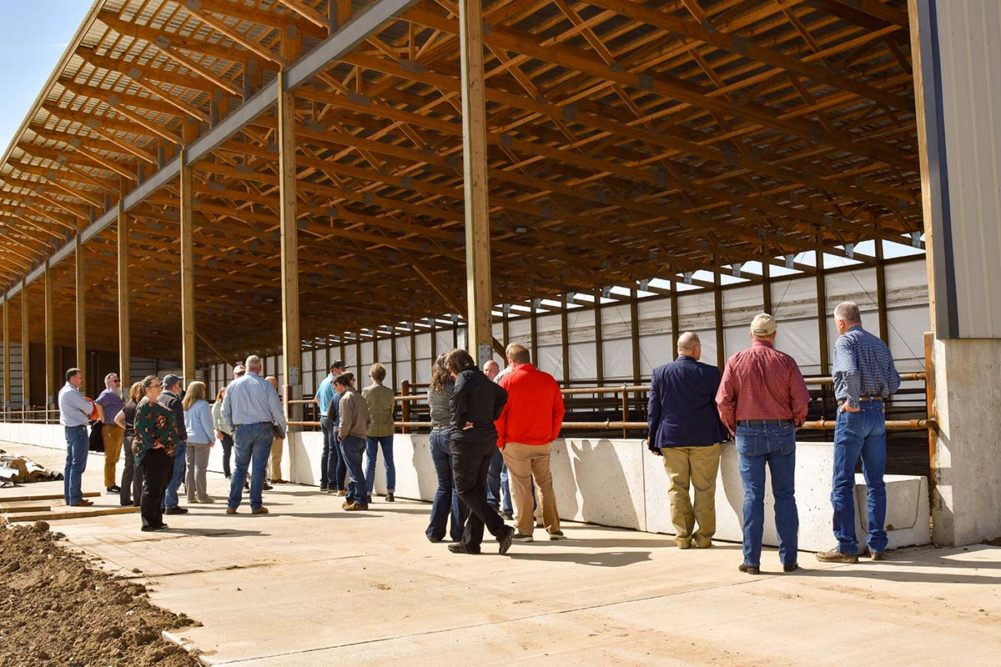LINCOLN, NEB. — The University of Nebraska-Lincoln recently hosted a two-day meeting at its Eastern Nebraska Research, Extension and Education Center (ENREEC) to investigate the important research topics needed for the cattle industry and beef research.
The meeting also included Colorado State University and the USDA’s Ag Research Service, as it tried to collaborate with different institutions on future research and identify overlaps and gaps in existing research.
“The primary discussion is how do we optimize a beef production system on a landscape or ranch,” said Mark Boggess, PhD, director of the US Meat Animal Research Center in Clay Center, Neb. “How do we give that producer the best tools or the best opportunity to most optimally match their genetics, their forage base and their management systems?”
Boggess added that research also needs to examine potential future effects, such as climate change, extreme weather events, socioeconomic factors like animal husbandry practices, and other emerging issues, like carbon and nitrogen, greenhouse gas emissions, and public perception.
“We need to be able to demonstrate to the producers and society that maybe we are a lot better with respect to carbon and methane than we think,” Boggess said. “But we need to be able to understand those challenges. We need the research in place to do the methane work and to do the nitrogen cycling and the carbon work and to help producers understand their opportunities, help them understand how it all fits together with ecosystem services. So, it’s complex and growing. That’s why this meeting is so important, to bring all those people together.”
During the meeting, attendees received a tour of the Klosterman Feedlot Innovation Center (KFIC), which is still under construction but is expected to start receiving cattle in summer 2024. Industry donations mostly funded the commercial-scale feedlot research facility at ENREEC. UNL stated that the KFIC would double the current cattle feeding capacity at the center to 5,000.
The university also showed the Beef Innovation hub, which includes beef producers, allied industry professionals, stakeholders and researchers and educators from across all beef-related disciplines.
According to Galen Erickson, professor of animal science at UNL, the Beef Innovation hub includes representatives from range management to ecology, ag economics to genetics, meat science to social sciences.
He added that having producers and industry professionals involved in the priority process allows UNL researchers to bring that perspective and concerns to larger groups like the one assembled for the meeting.
Justin Derner, lead scientist with USDA ARS in Fort Collins, Colo., discussed that the agency’s research into environmental, management and socioeconomic systems has been strong. Still, they would like to improve the genetics component of their research.
“Because of this meeting we have connections now to enhance that genetics capacity and provide that sort of information to folks working in genetics, but also provide the value-added aspect to producers working with us from the genetic side,” Derner said.
Matt Spangler, UNL beef genetics specialist, stated the importance of getting to know people and understanding them beyond the research questions and discussions.
“There is a common interest in agriculture and helping address concerns that consumers have,” Spangler said. “It’s those one-on-one interactions, in my experience, that actually lead to long-term, sustainable collaborations. We’ve got exciting times ahead. I would say, though, I think it’s going to be an impossibility to raise cattle in 2050, using science from 1950. And so, the challenge is to make sure we address the needs of the beef industry and the consumer and ensure beef cattle producers have the opportunity to deploy scientific discovery.”


